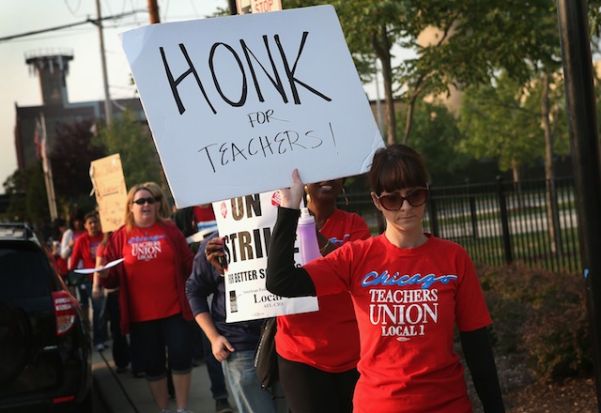The case of Vergara v. California could force the Golden State to end near-lifetime employment for public school teachers. It has their unions running scared.
Videos by Rare
Sure, the teachers unions are trying to put on a good face. Monday, the American Federation of Teachers issued a preemptive proclamation that it was confident the judge presiding over Vergara would rule in its favor.
The suit was filed on behalf of the families of nine Southern California children by homeless activist Alice Callaghan with help from school reform group EdVoice. The AFT calls it nothing more than an attempt at “pitting parents against teachers.”
The union sees itself as the hero in this struggle, pitted against reformer bad guys such as billionaire Eli Broad and former DC schools chancellor Michelle Rhee. Their real goal, argues AFT, is to weaken “due process for teachers.”
Wrote Michael Powell, the mouthpiece for AFT President Randi Weingarten: “the Vergara plaintiffs’ lawyers continue to rely on fear and the threat of job loss as ‘tools’ for improving teaching practice.”
The AFT is making noise about an obscure case because it is not likely to remain obscure. An unfavorable verdict in Vergara would serve as another defeat for it and the National Education Association in their struggle against education reformers.
Even better, a defeat would threaten the grand bargain the two unions have struck with teachers that have long sustained their coffers.
The teachers unions have fought efforts to reform teacher compensation and pensions. They have fought cost-cutting Republicans and found the Obama administration’s education team to be full of unsympathetic, centrist Democrats.
But the AFT and NEA have managed to beat back reformers when it comes to the one area of compensation that makes teaching the most-comfortable profession in the public sector: near-lifetime employment regardless of classroom performance.
This matters greatly because teacher performance is the most-important factor in improving student achievement, and there is little evidence that teachers get any better at their jobs the longer they work. A teacher is no more successful in improving student achievement after 25 years of teaching than an instructor working for four years, according to a 2010 report by Dan Goldhaber and Michael Hansen of the Center for Reinventing Public Education.
This starts with tenure. Originally granted by states in the 1920s to protect women of child-bearing age from unfair dismissals, tenure has become so easy for teachers to attain because all but eight states allow them to achieve that status in less than five years. In California, newly-minted teachers attain near-lifetime employment after just two years on the job.
Twenty-eight states still don’t allow for the use of student test growth data from standardized tests to decide which teachers can gain near-lifetime employment. Another eight only use performance as a secondary consideration in those decisions.
These laws, plus the bureaucratic incompetence, all but ensure that teachers will gain tenure. Only 70 percent of new hires were even evaluated by the Los Angeles Unified School District during the 2009-2010 school year, according to a 2011 study by the National Council on Teacher Quality, a school reform advocacy group.
Then there are state laws governing teacher dismissals, which can protect even the most-incompetent or repugnant teachers, from termination. In California, a district must go a 10-step process, including appeals before a three-person review panel that is largely controlled by NEA and AFT locals, before a dismissal is even possible.
The process can last seven years and cost a district as much as $7 million. There is no guarantee that even the most-obviously incompetent teacher will be eventually shown the door. This is why just 100 dismissal hearings were heard between 1996 and 2005, according to the state’s Legislative Analyst’s Office.
Even allegations of sexual misbehavior towards students are not enough to get a teacher removed. Three years ago, L.A. Unified paid teacher Mark Berndt $40,000 just to get him to drop the appeals of his dismissal despite evidence of incompetence and immoral conduct. Berndt would eventually be charged by Los Angeles County prosecutors with 23 counts of “lewd acts” against his students.
Efforts of school reformers, along with that of the Obama Administration through its Race to the Top initiative, have helped make it a bit easier to keep out incompetent teachers. But thanks to the lobbying heft and campaign coffers of NEA and AFT affiliates, it is still far too easy for awful teachers to keep their jobs.
Eighteen states still do not explicitly allow districts to use performance data in dismissing teachers, according to NCTQ. This includes California, whose legislature has long been in the pocket of teachers unions. Even amid the scandal over Berndt’s abuse of students two years ago, the NEA and AFT helped kill a bill which would have made it easier for districts to fire teachers accused of abusing their students.
But now, the Vergara case has put the NEA and AFT on the defensive. The plaintiffs are claiming California’s teacher dismissal laws violate the Equal Protection Clause of the state constitution.
That’s less of a stretch than it might sound because California courts have held that the state’s responsibility for a child’s education goes beyond providing access to a classroom. It must provide students with teachers and curricula that prepare them to be part of the economic and social mainstream as adults.
By all reasonable measures, the state is failing on that front. Teachers dismissal laws are a big reason for that failure, so the plaintiffs have got a decent case.
If a California Superior Court judge rules for the plaintiffs, state legislators will have to rewrite tenure and dismissal laws so they don’t so blatantly favor their teachers union allies. Reformers and parents in other states would be encouraged to file similar torts.
A Vergara verdict in favor of reformers (and ultimately, children) would strike another blow to the six decades-old grand bargain the NEA and AFT struck with teachers in which they would lend the unions support for their aims in exchange for better pay and conditions.
This couldn’t come at a worse time. Losses to school reformers have already weakened the two unions’ political muscle. As I wrote last month, teachers are also dismayed by the profligate spending by the two unions on matters that have nothing to do with their day-to-day concerns.
Even teachers are increasingly questioning whether tenure is useful for themselves and their students. Younger teachers, in particular, think that tenure forces them to work with incompetent colleagues and poorly-taught students. A full 63 percent of teachers surveyed in 2011 by Education Sector said tenure “had very little to do” with the quality of teaching.
But it has everything to do with the union bosses keeping their jobs.



